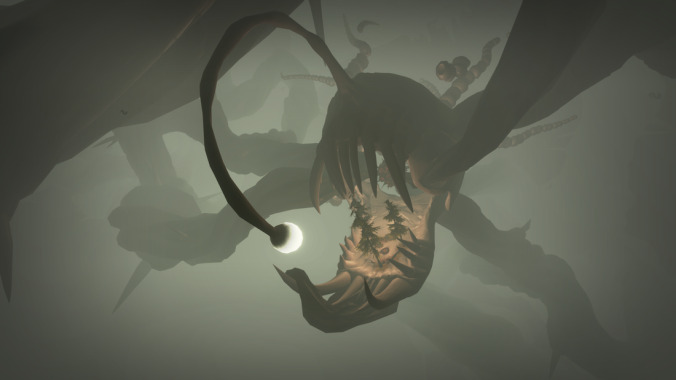Outer Wilds makes an art form out of “Oh fuck, I’m going to die in space”


Every Friday, several A.V. Club staffers kick off our weekly open thread for the discussion of gaming plans and recent gaming glories, but of course, the real action is down in the comments, where we invite you to answer our eternal question: What Are You Playing This Weekend?
I’ve been walking along the ceiling for maybe two minutes when gravity finally catches up with my bullshit. I’m still not sure exactly what went wrong; some misstep took me outside the field of the magical glowing purple crystals keeping my feet glued to the floor, is my best and only guess. But once I start to fall (after a gut-twisting flip of my vision as “down” very rapidly becomes “up”) I do so with prejudice. As I fall toward (because when you’re walking on the inside of a planet’s surface, staring up at what appears to be a black hole sitting where its core should be, “toward” is the only direction that’s really relevant), the only thought that goes through my head is “Oh fuck, I’m going to die. Again.”
Outer Wilds is a game about dying in space. And also exploring and archaeology and mysteries and time, but it’s the dying that’ll occupy a decent chunk of your early time with it. It’s a horror game where the most terrifying monsters are things like physics and poor planning. (There may also be some actual monsters; there’s an ocean planet I’m way too scared to dip below the surface of just yet.) Maybe you fly into the sun. Maybe you get blindsided by a moon, moving at spaceship-smooshing speeds. Maybe you just run out of time. Either way, you’re dead—until you’re not, as time rewinds, and you’re right back where you started, staring up at the stars in your idyllic, rustic village, and wondering just what the hell is going on.
Amazingly, this is not what happens to me when I plummet, sans spaceship, into the black hole at the center of a planet. Instead, there’s a flash of white, and I’m suddenly elsewhere. Or maybe else-nowhere, because I’m now floating at the edge of space, a few meters from a white sphere that appears to be the opposite number of the body I just fell into, and a hundred kilometers from fuck-all else. Turning, I scan the horizon of empty space, and my UI helpfully points out the location of my ship—still on the planet I just got forcefully evicted from, half a solar system away. I take a look at my suit’s oxygen and fuel meters. A warning light beeps. “Oh fuck,” I think. “I’m going to die. Very, very slowly. Again.”
It’s in this moment that all the ways that Outer Wilds is not No Man’s Sky—the game it’s most likely to find itself compared to, what with all the spaceships and indirect narratives and whatnot—come clearly into focus. For one thing, space in Outer Wilds is deceptively small, a matter of miles, not light-years. Give me 10 minutes, and I could probably reach, on my own power, one of the planets currently orbiting around the system’s sun—maybe even one with oxygen, if I’m lucky. Sure, I’d almost certainly die from impact as my suit’s jets struggled to fight against some extremely terminal re-entry velocity. But that’s moot anyway, because I don’t have 10 minutes of air left. As my suit helpfully informs me, I have a little less than five.
And, again, if this were No Man’s Sky, I’d have something in my inventory that could help me, some ship-summoning tool or nifty modification to make my oxygen last way longer. As is, I don’t really have an inventory at all; just my suit, a telescope, and a launchable camera that will allow me to check out some grainy pictures of space as I slowly asphyxiate. Outer Wilds is a lot more minimalist (and generally a lot less confusing for it), and that factor is working against me at the moment. Fighting off disorientation and despair, I look all around me, trying to find a solution. This is still a video game, right? There’s got to be a way out of the trap.
And suddenly, I see it: Floating not far from the anomaly, a glint of manmade materials held in the grip of a ruined asteroid. Burning another eighth of my fuel (and ignoring my rapidly dipping oxygen gauge), I fly toward it, scanning it for openings. Nothing, nothing, two minutes of oxygen left, nothing; I’m starting to suspect that this is the sort of thing I’m meant to be investigating with a spaceship, and not as a single, isolated person who’s about to become just another piece of non-interactive space debris. “One minute,” my suit beeps, and I catch a flash of purple, the distinctive coloring of the Nomai, the game’s go-to precursor race. I fly toward the opening, praying it’s actually an opening, and not just a very elaborate window.
Anyone who tells you that “I love you” is the most beautiful sound in the universe has never heard the hiss of an oxygen tank refilling as a stranded spacefarer sets foot—gravity! My beautiful nemesis! My beloved foe!—inside White Hole Station, a survival waystation for all the people who also apparently fell out of their planet and into the depths of space. (The Nomai have many innovations; guardrails weren’t one of them.) Not only is there air, but a helpful note (filtered by my delightfully clunky-looking translation device) informs me that if I stand in the center of the station and look up, I’ll be teleported back to the planet. Not near my ship, admittedly but, hey: When looked at as a percentage of distance traveled, it’s one hell of an improvement. And, of course, I know a shortcut…
The thing about traveling through the core of a planet is that it’s hypothetically a lot faster then trying to walk round it. I tell myself this as I gently make my way down the platforms above the roiling black hole, certain I’m making several different kinds of dumb mistake at once as I try to shave a few minutes off my trip. Suddenly, I slip, and that same sickening fall begins all over again. “Not again,” I think, and slam my jetpack controls, desperately trying to keep away from that inexorable pull. “It’s working!” I think, as I spin around the massive cavern, taking on speed, but staying above the event horizon. “It’s working!” I think, just before I crash into a pillar at high velocity, abruptly snapping my neck. “Oh fuck,” I think, as the rewind spools up. “I’m dead.”
I’m back at the starting point, my ship waiting on its launch pad somewhere up above me. I look up at the stars: vast, and full of mysteries and moments of death. And also, occasionally—and against all the odds—survival.
“Again!”